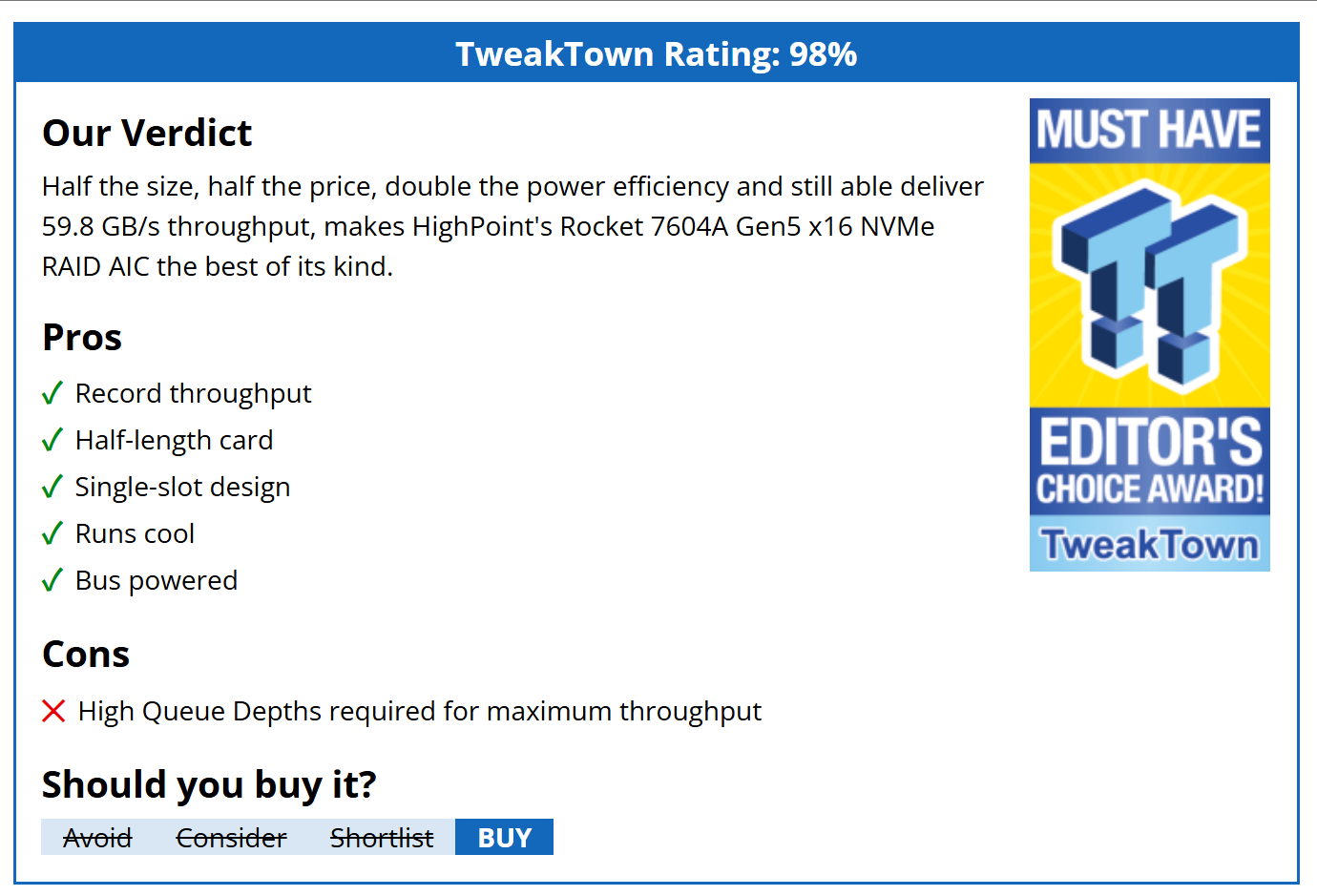HighPoint Rocket 7604A Gen5 x16 NVMe RAID AIC Review - Half the Size, All the Speed
If what you do would benefit from over 59GB/s sequential throughput, then HighPoint's newest PCIe Gen5 x16 half-length AIC can get you there efficiently.


Jon Coulter
Senior Hardware Editor
Published Jun 11, 2025 9:20 AM CDT
Manufactured by HighPoint with an MSRP of $999
6 minutes read time

Introduction & Drive Details
About a year ago, TweakTown spends spent some time with HighPoint Technologies 1608A AIC (Add-In-Card) RAID card. This card enabled up to eight PCIe Gen5 SSDs over a single PCIe x16 slot, capable of delivering almost 60 GB/s sequential throughput.
HighPoint's 1608A RAID switch card delivered what is still today the most throughput we've ever seen or recorded for a single-slot PCIe Gen5 storage device, delivering up to 59,700 MB/s throughput. However, that record-setting throughput came with a few inconveniences. Being an up to 8-drive AIC, the 1608A checked in at roughly the same length as a high-end GPU and requires external 6-pin power.
At the time, we wished for something half the length, with no external power required, but we didn't think something fitting our wish could deliver the throughput or versatility offered by the 1608A. Well, fortunately, we were wrong, and what we have for you today is everything we had hoped for.

HighPoint's newest is an absolute masterpiece of engineering, being a half-length 4x M.2 card that's only 167 mm in length. Contrast that with the competition needing up to 290 mm to deliver the same functionality. Impressive, and wait until you see the throughput our new favorite server-grade AIC can deliver.
HighPoint's Rocket 7604A AIC employs a Broadcom PEX89048A RAID controller and four PCIe Gen5 x4 M.2 channels. For full throughput, you can either stripe the drives into a dynamic disk, better known as software RAID, using Windows Disk manager. The only drawback to MS software RAID is RAID 0 or RAID 1 (mirrored) are the only options when configured with Windows. Or you can use HighPoint's NVMe Driver and RAID configuration utility, which will allow for custom stripe configurations as well as RAID 10.

Additionally, the Rocket 7604A is backward compatible with PCIe Gen4 SSDs, but you will only get half the throughput or around 30 GB/s with PCIe Gen4 SSDs.
Naturally, we went with PCIe Gen5 SSDs for our testing purposes. Our choice of SSD to populate the card's 4x M.2 slots - 4x Samsung 9100 Pro 1TB. We chose this configuration as we feel it's the most efficient in terms of power and overall cost while still being able to achieve that breathtaking 59GB/s sequential throughput.

Whatever SSD you choose, note that the SSDs must be bare drives to fit the card.
Okay, let's get into this review and see exactly what the HighPoint Rocket 7604A can do for you by the numbers, keeping in mind that it is a highly specialized product not intended to be used as a typical consumer storage device. It is intended for content creation applications where higher sequential throughput equals faster data processing. As such, this will be a standalone review without comparison products or charts. We chose to test the HighPoint Rocket 7604A using both our Intel workstation and AMD platforms as we feel these best represent a common workstation setting.
Of note: HighPoint has cut the price of its 7604A AIC from $1999 to $999, making it an incredible bargain for a server-grade RAID card. And one final note before we dive in: all benchmarks will be presented as Intel first, followed by AMD throughout.
Drive Details





Jon's Test System Specifications
Intel Workstation Test System

AMD Test System

Benchmarks: CDM, ATTO, Blackmagic, Anvil & DiskBench
CrystalDiskMark
We employ CDM as our standard benchmark for sequential throughput.


In terms of sequential throughput, we find our test subject fully capable of exceeding quoted up to factory throughput specifications. At almost 60GB/s with only 4x SSDs, the 7604A is delivering better than any AIC we've ever encountered. Impressive. Intel or AMD, this is the pinnacle of sequential throughput over PCIe Gen5.
ATTO




ATTO gives us a clear picture of what transfer sizes a particular SSD favors in terms of sequential throughput. With 4x SSDs, our test subject favors sequential transfers of 4MB or larger when serving data to the host (reading) and 4MB or larger when programming (writing) data. With up to an incredible 54GB/s, our 4x Samsung 9100 Pro array delivers more than double what we got from the 1608A with an 8x Crucial T705 array. Additionally, our Samsung arrayed test subject can deliver full speed at QD4, while the T705 arrayed 1608A could only deliver 13GB/s at QD4.
Blackmagic


When serving data to the host (reading) or programming it (writing), we find our test subject delivering far more than any similarly interfaced device we've ever tested. Here we find Intel with the edge over AMD.
Anvil's Storage Utilities


The previous record for a flash-based SSD AIC was a total score of 65,587. Our 9100 Pro arrayed 7604A AIC takes that to a whole other level, returning a total score of 93K. Impressive. Here again, we see Intel with a big advantage over AMD.
DiskBench - Transfer Rates


Our 100GB data transfer is composed of more than 62,000 files of random types of data, making it very hard to swallow for any storage device, especially for a sequential specialist like the Rocket 7604A. Not the type of data the Rocket 7604A is targeted at, we just wanted to see how it would handle it. Surprisingly well all things considered. Here we find AMD to have the advantage.


Our read transfer file is more to the Rocket 7604A's liking because it is a single zip file. However, this is a single-threaded benchmark, and that is not to the HighPoint card's liking. Despite its aversion to what we are transferring, the 7604A running on our AMD platform manages yet another lab record. Impressive.
Final Thoughts
HighPoint's newest is another masterpiece of engineering, maybe its best yet. A server-grade AIC that gives us everything we want and nothing we don't for the bargain price of $999 is a refreshing sight to behold. This card skimps on nothing and does so at half the size of its predecessors. Impressive. We would also note that our selection of Samsung's 9100 Pros appears to be the right choice, as they have proven to run significantly better than anything else we've used to array an AIC with.

HighPoint's Rocket 7604A Gen5 x16 NVMe RAID AIC delivers the highest sequential throughput of any storage device we've ever encountered, and as such has earned our highest award. Editor's choice.

.png)